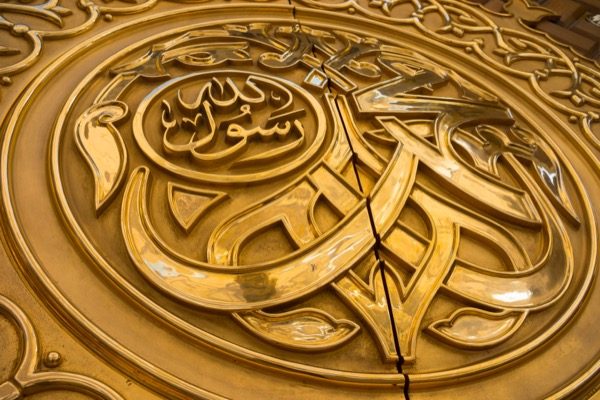Author of If the Oceans were Ink sits down to speak to The Review of Religions.
By Ayesha Mahmood Malik
Carla Power exudes a radiant vibrancy personifying a fusion of East and West. When we meet in the café of the National Library on the South Bank in London, she appears in a rich maroon dress splashed with paisleys finished with a bottle green cape and a pair of traditional Indian earrings. I am not surprised. In her seminal work If the Oceans Were Ink – a book espousing an external observer’s viewpoint on the verities of the Qur’an and one she wrote having spent a year studying with an Islamic law scholar based in Oxford – Power speaks of how she inherited ‘an immersive interest in the Islamic world’ from her father. The family was posted frequently in the Middle East through her father’s occupation as a law professor and friends have referred to her parental home in St. Louis as ‘Aladdin’s Cave’ for its formidable collection of exotic artefacts from across the Middle East and Asia.

Author of If the Oceans were Ink
To be sure, Power emulates perfectly the hospitality and generosity often found in Middle Eastern and South Asian cultures. I have yet to come across a journalist who is so generous and giving of their time. Our meeting is solely a consequence of her continued patience and willingness to make herself available – notwithstanding her frequent travels and other commitments she has still very kindly agreed to see me on an afternoon she is otherwise spending with family in London away from her home in Brighton.

Power is a former correspondent for Newsweek where she produced award-winning stories focusing on Muslim communities and reported from Europe, the Middle East and Asia. She currently writes for Time while her book If the Oceans Were Ink has been long listed for the National Book Award and was the Pulitzer Prize finalist for general non-fiction in 2016. With her childhood infused with memories of archaic lamps, quaint market places and intricate calligraphy, and her adult life been dotted with stories of Muslim communities she had spent years reporting on, Power felt a palpable urge to delve deeper into the scripture wherefrom spring its 1.6 billion followers worldwide. She decided that before she could continue to comment, understand and investigate Muslim lives, she needed to educate herself on their principle source of inspiration – the Qur’an. Her book was the result. And while her book explores everything from the Verse of the Sword to Mary(ra), it was her chapters on women that I wanted to probe her on.

As we settled down to a coffee on that brisk December afternoon, a bustling Southbank sketched the background against which Power sat, her back towards the café’s tall windows. I thought to start in the most ‘traditional’ of places and referred her to page 138 of her book where she writes:
‘Aisha is not the only wife of Muhammad whose life explodes notions of what constitutes a ‘traditional’ Muslim woman.’
When I asked her to define what in her view was a ‘traditional woman’ she looked immediately concerned and prompted me for the context in which in which I had asked. I pointed her to the relevant passage in the book and added that she had placed the word in inverted commas. I sensed relief as Power responded, ‘Oh okay, that makes me feel better. We should say that I put that in quotes as it gives it a completely different cast.’
Her initial perplexity over having potentially generalised the notion of ‘traditional’ is delineated well by the answer she provides: ‘The prevailing – and highly politicised, I would add – notion of what makes a traditional Muslim woman, it depends on who you ask, I would say. It’s like beauty is in the eyes of the beholder…the notion of a traditional Muslim woman has been, shall we say, recreated by all sorts of patriarchies and all sorts of political agendas and it serves all sorts of purposes.”

This last sentence is bold and refreshing, a break from the mundane rhetoric of stereotyping and pigeonholing Muslim women found too often among Western thinkers, journalists and writers. Power continued by narrating an incident she speaks about in her book as well – the time around the run up to the invasion of Afghanistan and Iraq where saving Muslim women was a ‘leitmotif’ – the thinking that we had to ‘free these women from their burqas.’ She describes remembering a scene when a storm of photographers gathered to capture the moment the women of Kabul were to lift their burqas and said it made for a ‘dramatic picture.’ Yet she is quick to point out the irony: ‘of course now…around 15 years later, they’re [Afghan women] still in many ways forced to live traditional lives in part because of the chaos.’
Her answer also serves as an adequate precursor to my next question that refers to a passage in her book on Aisha(ra) on page 139, where Power writes:
‘Reading about Aisha – how she’d fret over the Prophet staying out too long in the sun, or how she’d recite scores of poetry verses from memory – I was exultant. So much of Aisha’s life closed the gap between Islamic traditions of womanhood and my own feminist sensibilities.’
The gap Power speaks of – one between Islamic traditions of womanhood and a Western woman’s feminist sensibilities – lies at the heart of the debate between Islamic feminism and Western feminism. The substantive elements of the debate having been exhausted in mainstream discourse, I am intrigued to learn Power’s views on how she thinks this gap actually came to be. Personally, I tell her that the gap was created, broadly speaking, by a gradual deterioration of Islamic legal tradition into something antithetical to its source with Muslim-majority countries leading that charge and part by misplaced views on the Islamic faith being entrenched by the mainstream media. I wondered if she agreed with this?
‘I think that’s a sound analysis,’ she begins. ‘I think everything from the moment Napoleon steps on shore in Egypt in 1798 and gathers the imams around and lectures them and says, “we are the true Muslims, you can learn from us,” you’ve got a colonial situation, where in intellectual and practical ways you were not having the best and the brightest go to madrasa. If you were a thrusting young man in 19th-century India, say, you would want to go to British school. You know, because that way lies the ICS [the Indian Civil Service], that way lies success…Or that you were encouraged to relegate Islamic learning to this “Western learning”, much of which, of course, ironically derives from the texts that were translated in 12th and 13th-century Baghdad. The sadness with which I see this kind of brittle and shrill and insecure Islamic tradition being trumpeted by extremists on both sides, and what’s left is flexible, thoughtful people who are like the sheikh I was lucky enough to have a friendship and a scholarship with. You know that that kind of quietist tradition just is not seen.’

Read part 2 of our conversation with Carla Power here: https://rorenglish.wpengine.com/14429/if-the-oceans-were-ink-part-2/
About the Author: Ayesha Malik is a lawyer and deputy editor of the law and human rights section for The Review of Religions.




Add Comment